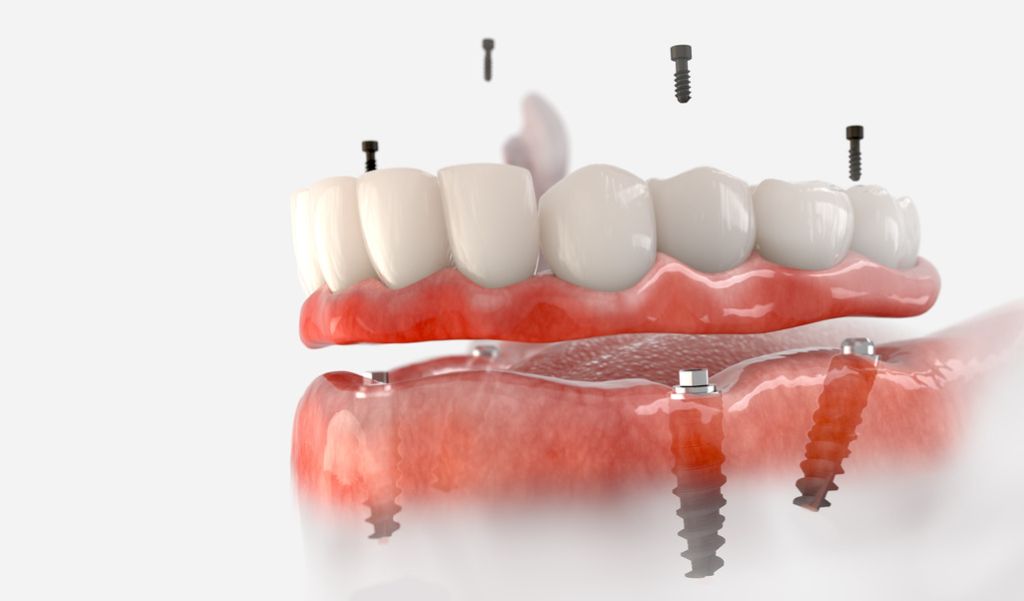Implantology is the branch of dentistry responsible for replacing teeth with dental implants through surgery.
Today, as a result of technological developments in diagnostic tests, such as 3D radiology techniques, it is increasingly possible to create implants that are “tailor-made” for the patient, offering more predictable, personalized and comfortable solutions for the patient.
These treatments have thus become more accurate, also thanks to facial scanners and digital molds, which allow for the creation of very precise surgical guides.
What are dental implants and what are they for?
Dental implants are medical devices made of an alloy of titanium and zirconia that is biocompatible with the human body.
They replace the natural tooth (more precisely its root) when, for some reason, we no longer have one, and serve as the basis for single crowns or fixed or removable bridges, partial or total.
Why is it important to replace missing teeth?
Tooth loss can occur for any number of reasons, from oral health problems to trauma.
Missing teeth will cause other teeth to move and occupy the empty spaces. This can result in deficiencies in the occlusion of the mouth and in chewing, which also harms the muscles and joints.
This can lead to pain, gum and bone loss and changes in features.
What are dental implants and what are they for?
Dental implants are medical devices made of an alloy of titanium and zirconia that is biocompatible with the human body.
They replace the natural tooth (more precisely its root) when, for some reason, we no longer have one, and serve as the basis for single crowns or fixed or removable bridges, partial or total.
Why is it important to replace missing teeth?
Tooth loss can occur for any number of reasons, from oral health problems to trauma.
Missing teeth will cause other teeth to move and occupy the empty spaces. This can result in deficiencies in the occlusion of the mouth and in chewing, which also harms the muscles and joints.
This can lead to pain, gum and bone loss and changes in features.
What are the differences between implants and removable prostheses?
When a tooth is missing, the closest solution to a natural tooth is an implant. As well as being more aesthetically pleasing, implants restore almost all chewing function and allow for more careful and effective oral hygiene.
However, there are cases in which patients opt for removable prostheses. Some of the reasons for this are: not being able to afford the costs associated with implants or not being able to do a definitive implant-supported rehabilitation (in the case of patients without any teeth).
In the latter situation, a removable implant-retained solution is usually chosen, i.e. a number of implants are placed, the main function of which is to support the removable prosthesis.
In general, removable prostheses are not recommended because, as they are supported by soft tissues such as the gums, they atrophy the bony structure of the mouth, creating lesions such as traumatic ulcers, soft tissue hyperplasia or prosthetic stomatitis.
What are the differences between implants and removable prostheses?
When a tooth is missing, the closest solution to a natural tooth is an implant. As well as being more aesthetically pleasing, implants restore almost all chewing function and allow for more careful and effective oral hygiene.
However, there are cases in which patients opt for removable prostheses. Some of the reasons for this are: not being able to afford the costs associated with implants or not being able to do a definitive implant-supported rehabilitation (in the case of patients without any teeth).
In the latter situation, a removable implant-retained solution is usually chosen, i.e. a number of implants are placed, the main function of which is to support the removable prosthesis.
In general, removable prostheses are not recommended because, as they are supported by soft tissues such as the gums, they atrophy the bony structure of the mouth, creating lesions such as traumatic ulcers, soft tissue hyperplasia or prosthetic stomatitis.
In fixed oral rehabilitation we can choose to rehabilitate with:
Implant that is inserted into the jawbone under the gums
Implant that is inserted into the gum under the jawbone
Implant that is inserted into the zygomatic bone
In fixed oral rehabilitation we can choose to rehabilitate with:
Implant that is inserted into the jawbone under the gums
Implant that is inserted into the gum under the jawbone
Implant that is inserted into the zygomatic bone
What is the step-by-step procedure for placing a dental implant?
The first step in placing a dental implant is planning, i.e. assessing and guiding the application of the implant, even before surgery.
The next step is surgery, where the implant is placed, while tooth extractions and bone regenerations may be necessary.
This is followed by the rehabilitation phase, in which molds are made to produce the teeth that will later be placed on the implants.
Finally, we must not forget the importance of maintenance, complying with all medical instructions and taking care of oral hygiene.
What is the step-by-step procedure for placing a dental implant?
The first step in placing a dental implant is planning, i.e. assessing and guiding the application of the implant, even before surgery.
The next step is surgery, where the implant is placed, while tooth extractions and bone regenerations may be necessary.
This is followed by the rehabilitation phase, in which molds are made to produce the teeth that will later be placed on the implants.
Finally, we must not forget the importance of maintenance, complying with all medical instructions and taking care of oral hygiene.
Are there any contraindications to dental implants?
Yes. There are some people who cannot have dental implants, such as:
- Pregnant women;
- Children;
- Young people who don’t have all their teeth developed;
- Individuals with uncontrolled diabetes or serious systemic diseases;
- Cancer patients or those undergoing radiotherapy or chemotherapy treatments;
- Chemical dependents;
- Patients taking medication with bisphosphonates.
Are there any contraindications to dental implants?
Yes. There are some people who cannot have dental implants, such as:
- Pregnant women;
- Children;
- Young people who don’t have all their teeth developed;
- Individuals with uncontrolled diabetes or serious systemic diseases;
- Cancer patients or those undergoing radiotherapy or chemotherapy treatments;
- Chemical dependents;
- Patients taking medication with bisphosphonates.
In the event of tooth loss, implants are a good solution, as far as they allow:
─ Restoring masticatory function
─ Maintaining bone structure and facial aesthetics
─ Preserving the good condition of the other teeth, without wearing them down, as happens when bridges are fitted
─ Offer greater stability to prosthetic structures
─ Restoring the patient’s self-esteem and self-confidence
Frequently Asked Questions
The placement of a single dental implant can take only around 15 minutes, while the application of a bi-maxillary dental implant can take 2 to 3 hours.
The success rate for the osseointegration of dental implants is around 98%.
Placing the implant is not painful, as it is usually done under local anesthesia (it can also be done under conscious venous sedation or general anesthesia).
In the post-operative phase, you may feel discomfort, which can be alleviated by taking medication prescribed by the doctor. The day after the procedure, you can go to work.
Studies and trials have shown that a dental implant can generally last between 5 and 10 years. Naturally, for this to happen, it is important that the patient has good oral hygiene habits and makes regular maintenance appointments (more or less every 6 months).
In these cases, a gum and/or bone graft is recommended.
The average healing time for dental implants is between 8 and 12 weeks, depending on the case.
Dental implants should only be placed when teeth are missing and not to replace natural teeth.
Nowadays, dentistry takes a conservative stance, which means that it is committed to preserving the oral health of natural teeth, promoting a series of treatments aimed at protecting the natural tooth and the periodontal tissues that surround it.
The implant is inserted directly into the bone of the jaw and/or mandible which, after healing, will fix the dental implant.
Dr. João Figueiredo
Surgery | Implantology | Occlusion
Dr. João Botto
Surgery | Implantology
BOOK YOUR APPOINTMENT ONLINE
We reply within a maximum of 24 working hours.























